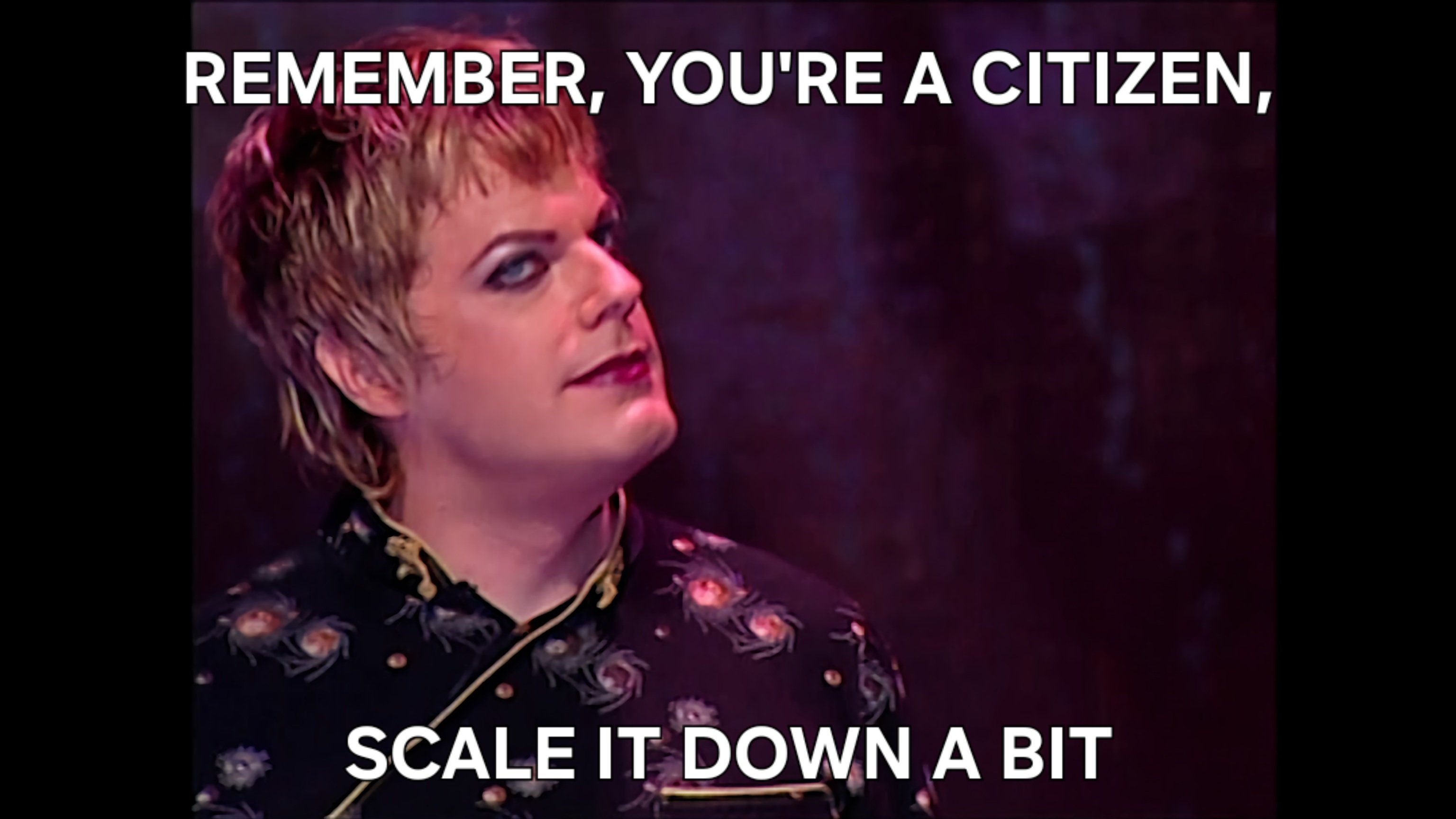Financial security and the freedom to express myself how I want without prejudice or persecution.

Sorry, friend, but I need a dream to chase
Actually the trick is to write down stuff when you weren’t able to do then.
I would do the following:
Build a PC, Buy a bike and travel, Buy a bicycle and ride it on trails, If single: casual dating, Develop a skill like musical instruments or learn a language.
I don’t like going to the gym because lifting weights and treadmills are quite boring. Instead I would play sports like football, badminton, etc.
Those are all easily achievable goals, so definitely get started :)
You can do most of that now!
American football or soccer?
No
Edit: the one with the round ball
yeah part of being an adult is when you realize without disposable income, all you can do is sit there until you die because you have no money beyond bare minimal survival so all you can afford to do in your leisure time is sit there and think.
Sleep.
I want deep, restful sleep.
For 8-10 hours uninterrupted by anyone or anything.
This can be perfection for me provided the following is true:
The room is cool and has blackout curtains
I’m snuggled up in a warm blanket
There’s light rain sounds outside and distant thunder in the distance (you can feel the rumble too)
For the latter: put a surround-set under your bed, with a big subwoofer. Go to e. G. Mynoise.net and live your life as a pluviophile mad man 😁
That used to happen. When I was 10. Then I was a teenager and it stopped happening. Then I got dogs and it never happened again.
I want to be a cool skeleton
I want to wear stuff like this. =D
There’s nothing stopping you from becoming the fabulous human being that you want to be
Do it
I want a dude equivalent of this but my wife won’t let me buy samurai pants.
Me too
I definitely want more energy than I have these days (and no, I don’t mean “the winter season”).
To quote Robert Baratheon I’m not trying to honor you. I’m trying to get you to run my kingdom while I eat, drink, and whore my way to an early grave
This seems to be the approach of every billionaire or person of means, to the exclusion of interest in their own offspring or legacy. There are few Tywin Lannisters, and they can be dicks as well.
I was raised to invent / discover some science or useful art. My dad did some work with solar-synchronus orbits. Still, all of human society is expecting a major population correction (mostly famine) in the next half century, which is likely to wipe out all the culture and science we have. We’ll be lucky if Relativity or Beethoven’s symphonies survive as we get knocked back to the iron age, let alone space science. Maybe Rob has a point.
For now, I’m so depressed, I exist to pet my cat and walk my dog and tell people online they are valid, even if the human species has a tragedy of the commons glitch that may be its great filter.
Still, all of human society is expecting a major population correction (mostly famine) in the next half century, which is likely to wipe out all the culture and science we have.
Sorry to be that guy, but
[]. Not only on the first part (that “all of society” is expecting that), but also on “likely to wipe out all the culture and science”. Those are both extraordinary claims, at least to me.Fair enough, I was oversimplifying.
It’s only a small portion of the climatology academic consensus that considers a massive population correction and civilization collapse. Specifically, if the average global temperature reaches pre-industrial mean M +4℃, (NASA page) our infrastructure will not be able to sustain support of a global population of one billion people (some scientists predict significantly fewer humans can survive.)
Granted, that’s a big contingency. We’re headed towards M+4℃ rapidly and we’re watching as contingencies accelerate the rate the global temperature climbs, whether from massive methane releases from the Siberian tundra or the ocean heat absorption declining as it acidifies. (I’m not fully aware of the correlative relationship in that one)
And yes, a lot of factors might mitigate or reverse the process. Many nations are accelerating their response to global warming concerns, ramping up sustainable energy resources over those that produce greenhouse gasses. We may engage in one or more geoengineering projects which mitigate the global temperature rise.
But right now, the projected trajectories don’t look great. Without some major push by the world’s nations and companies (that is, our oligarchical elite) we’re still going to see M+4℃ before the 22nd century.
But who cares? If it’s just a handful of Cassandras wailing about the world turning into a Roland Emmerich movie setting, then the rest of the community isn’t so bothered, right?
Well, here’s the thing: The rest of the academic consensus just doesn’t consider projections like that at all. They don’t deny that this is the expected outcome, or suggest scenarios in which we can endure M+4℃ and be fine. They’re not even imagining we’ll imminently solve the CME problem with settling on the moon or Mars. They’re just assuming that something amazing will happen between now and then and will postpone M+4℃ indefinitely, or at least to some future century.
They’re also not looking to deeply into what that something amazing might be. We don’t have think-tanks designing large geoengineering schemes. We are working on small steps that bring fusion energy closer, make solar energy and wind energy a little more sustainable. We are collectively doing a lot of not-big things that are definitely not going to slow down the speeding runaway train that is M+4℃
Furthermore it’s not like everything will be peachy at M+3.99℃ and we have nuclear holocaust as the needle hits the +4℃ tick. We’ve long known M+1.5℃ is going to be a shit show, as the coasts get hammered by hurricanes, more of the equatorial belt becomes unlivable and nonarable, more of our vert and forests burn (or are stripped by industry – that’s still a thing), and these factors are going to make it harder to organize the large scale projects we need to offset the infrastructure we depend on. (Mom, in Flagstaff AZ just sent a picture of her porch last week showing Montana levels of snow.)
Then there’s the sociology, which few people at all are thinking about, that it’s much more profitable to exploit disasters than it is to prevent them, that our billionaires are more inclined to build shelters in which they can pretend to be safe or create secret missions to Mars (that are likely to fail Stockton Rush style) than they are, create huge projects that serve the whole of society. So we can expect charitable contributions towards climate crisis mitigation to spring up like charitable contributions towards saving Haiti. As I said, the human animal has a tragedy-of-the-commons problem that we have yet to solve.
As for sources, Wikipedia teems with discussion of these matters, and there are some insightful pop-science climatology series on YouTube that dives deep into specific issues, either how we’re fucking ourselves, neat technology that might help, or how a specific situation can be unfucked. There are also ones on how shit is getting bad, is going to get worse and we really don’t want it to get worse. The internet has a lot of resources even while our search engines deteriorate.
And yes, in most climate science, the ongoing consensus is we really don’t want it to get worse and we’re doing way, way, way not enough to prevent things from getting worse. They like to leave it up to the rest of us how much of Titanic has to be underwater before be decide it’s actually going to sink.
I’d love, love, love, to be wrong. I’d like to imagine that humanity’s finest hour is yet to come. But my experience of human nature is we tend to not solve problems and let them become no-longer problems anymore. And we really are waiting for Greta Thunberg to try harder.
The outcome of least-resistance of the climate crisis is projected to heat the world to M+4℃ by 2100, possibly as early as 2040 or 2034 in very-worst-possible-timeline scenarios (clathrate guns, and biodiversity extinction acceleration and stuff like that). Famine and resource wars and no small amount of cannibalism is likely to be the order of the day. At that point we’re not going to be thinking about preserving Chopin and Shakespeare, but enough food to last the migration.

A miracle you picked one of his comments that didn’t involve a penis
Oh, I’ve got one of those saved somewhere.










